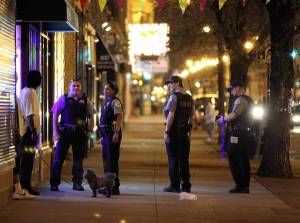Texts: Isaiah 60:1-6 + Psalm 72:1-7 + Ephesians 3:1-12 + Matthew 2:1-12
It’s been a fortnight since the winter solstice, the longest night. It’s been two full weeks of lengthening days and diminishing nights. The light that shines in the darkness has once again turned the tide, has not been overcome.
 It’s a sign of the times that when I think about a light in the darkness, the first thing that comes to my mind is the way my bedroom looks in the middle of the night when I press the home button on my phone to get a little light so that I don’t wake Kerry up. I can see the outline of all the objects in the room, but not their color. The pale blue light of the screen renders everything in a barely pastel monochrome, a black-and-white picture with a thin wash of sky, but there is no peripheral vision. Where I point the phone I seen the edges of a dresser or a door, but everything else stays black.
It’s a sign of the times that when I think about a light in the darkness, the first thing that comes to my mind is the way my bedroom looks in the middle of the night when I press the home button on my phone to get a little light so that I don’t wake Kerry up. I can see the outline of all the objects in the room, but not their color. The pale blue light of the screen renders everything in a barely pastel monochrome, a black-and-white picture with a thin wash of sky, but there is no peripheral vision. Where I point the phone I seen the edges of a dresser or a door, but everything else stays black.
The facts of our bedroom are exactly the same in the dark as in the light. The headboard is against the wall, the dresser is next to the closet, the radiator is in the corner. But in the dark I am still five years old, and sometimes when I wake up in the middle of the night my dreaming mind is still driving so I see shadows in the hallway and imagine that someone has broken into our home. I reach out for the phone next to the bed and touch the home button and shine the light around and I can remember what the apartment feels like when there’s food on the table and voices in the living room. A benign reality.
I’m curious about the darkness in your life, and about the light. It is that time of year when many feel the weight of the long nights in every muscle of their bodies, when sleeping and waking don’t feel all that different. For some, the time just after the holidays is filled with resentment or regret, the things said and left unsaid as the family gathered casting a long shadow over the first days of the new year. We know that the past few months in particular have been filled with grief and loss for so many members of our community, and we also remember that each of us carries griefs and losses that we’ve not yet shared. So I wonder about the darkness in your lives, and about the light.
The reading from Isaiah assigned to the festival of Epiphany — which is actually a fixed date on the calendar (January 6), but we’ve transferred to this morning so that we celebrate it together as we transition from the season of waiting and fulfillment to the season of revelation and wonder — begins, “Arise, shine; for your light has come, and the glory of the Lord has risen upon you.” (Isa. 60:1) The tiny lights we held in our hands on Christmas Eve have matured into a full blown dawn, foreshadowing the morning light at the tomb on Easter Day. “Weeping may linger for the night, but joy comes with the morning.” (Ps. 30:5) Reading on we hear the prophet imagine a day when “Nations shall come to your light, and rulers to the brightness of your dawn … They shall bring gold and frankincense, and shall proclaim the praise of the Lord.” (Isa. 60:3,6)
Because we stop reading there, and pair these verses with the story of the magi coming to witness the birth of Jesus, we reduce the power of the prophet’s voice to mere prediction. If we were to read on, past the end of the assigned verses, we would hear promises of gifts far better than gold and frankincense, the kinds of gifts we have been praying for here in Chicago in the wake of report after report of senseless deaths in our streets:
“The descendants of those who oppressed you shall come bending low to you, and all who despised you shall bow down at your feet; they shall call you the City of the Lord, the Zion of the Holy One of Israel … I shall appoint Peace as your overseer and Righteousness as your taskmaster. Violence shall no more be heard in your land, devastation or destruction within your borders; you shall call your walls Salvation, and your gates Paradise.” (Isa. 60:14,17b-18)
 Can you imagine a city where Peace patrolled at night, and Righteousness governed by day? Can you imagine a Chicago where violence was unheard of, a city not subdivided into North and South and West — but united by a common salvation, whose neighborhoods were a living paradise?
Can you imagine a city where Peace patrolled at night, and Righteousness governed by day? Can you imagine a Chicago where violence was unheard of, a city not subdivided into North and South and West — but united by a common salvation, whose neighborhoods were a living paradise?
In an opinion piece entitled “Dear White America,” written for the New York Times on Christmas Eve last week, George Yancey (a professor of philosophy at Emory University in Atlanta) wrote about the urgency of love as a response to the rising tide of racism in the United States today. It’s a beautiful and challenging essay that he describes as a gift, though reminding us that “some gifts can be heavy to bear.” This is how his letter to White America ends:
“If you have young children, before you fall off to sleep tonight, I want you to hold your child. Touch your child’s face. Smell your child’s hair. Count the fingers on your child’s hand. See the miracle that is your child. And then, with as much vision as you can muster, I want you to imagine that your child is black.”
The word epiphany is connected to the concept of revelation. Over time we have come to use it to signify an experience of insight, that moment when the lights turn on and things sensed in the dark are finally seen in a new way. Reality has not changed, but our experience of it is entirely new.
That is what is happening in this story from the gospel of Matthew in which the rich and powerful prove their wisdom by bringing all they hold precious and gladly giving it away in the presence of the infant Jesus. Epiphany is God’s love letter to a violent world, a heavy gift to bear, in which God’s declares solidarity with all who are oppressed. On the day of Jesus’ birth God declared, “I want you to imagine that I am small, and poor, and Jewish.” Today we might remember of Jesus, “I want you to imagine that I am Palestinian. I am a refugee.”
But anyone might take this story and make it their own, because as the dawn rises the light also spreads, and the news that was good for some people has in time become good for all people. You may hear in the story of the Epiphany, “Imagine I am a woman. I am a survivor. I am undocumented.” The epiphany is that your story is God’s story too.
When the night terrors become too much to bear, and we reach out to press the home button, we realize that God has come as an infant so that we might finally believe that God has come for us, as small and frail and insignificant as we sometimes, or always, feel.
So we celebrate Epiphany this morning, three days before the actual festival, which is fine by me because I think we could use our revelations sooner rather than later and I long to live in a city of Peace and Righteousness. And you, too, however small the light that burns inside of you: trust that it has been growing, the dawn has come, the days are lengthening, and the future is brighter than our expectations for it.
Arise, shine, for your light has come.
Amen.